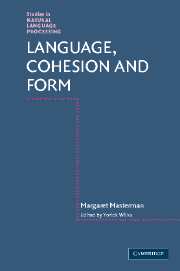Book contents
- Frontmatter
- Contents
- Preface
- Editor's introduction
- Part 1 Basic forms for language structure
- Part 2 The thesaurus as a tool for machine translation
- Part 3 Experiments in machine translation
- 6 ‘Agricola in curvo terram dimovit aratro’
- 7 Mechanical pidgin translation
- 8 Translation
- Part 4 Phrasings, breath groups and text processing
- Part 5 Metaphor, analogy and the philosophy of science
- Bibliography of the scientific works of Margaret Masterman
- Other References
- Index
8 - Translation
Published online by Cambridge University Press: 22 September 2009
- Frontmatter
- Contents
- Preface
- Editor's introduction
- Part 1 Basic forms for language structure
- Part 2 The thesaurus as a tool for machine translation
- Part 3 Experiments in machine translation
- 6 ‘Agricola in curvo terram dimovit aratro’
- 7 Mechanical pidgin translation
- 8 Translation
- Part 4 Phrasings, breath groups and text processing
- Part 5 Metaphor, analogy and the philosophy of science
- Bibliography of the scientific works of Margaret Masterman
- Other References
- Index
Summary
The purpose of this chapter is to present a philosophical model of real translation. ‘Translation’ is here used in its ordinary sense: in the sense, that is, in which we say that passages of Burke can be translated into Ciceronian Latin prose, or that the sentence ‘He shot the wrong woman’ is untranslatable into good French. The term ‘philosophical’, however, needs some explaining, since, so far as I know, no one has made a philosophical model of translation as yet. I shall call a model of translation ‘philosophical’ if it has the following characteristics:
It must not only throw some light on the problem of transformation within a language, but must deal also with the problem of reference to something. That is to say, it must relate the strings of language units in the various languages with which it deals to public and recognisable situations in everyday life. It is characteristic of philosophers that, unlike most linguists, they do not regard a text in language as self-contained.
It must deal in concepts, not only in words or terms. All philosophers believe in concepts, though they sometimes pretend not to.
It must face, and not evade, the problem of constructing a universal grammar, while yet recognising fully how greatly languages differ, and howperipheral is the whole problemof determining the nature of language.
- Type
- Chapter
- Information
- Language, Cohesion and Form , pp. 187 - 224Publisher: Cambridge University PressPrint publication year: 2005

